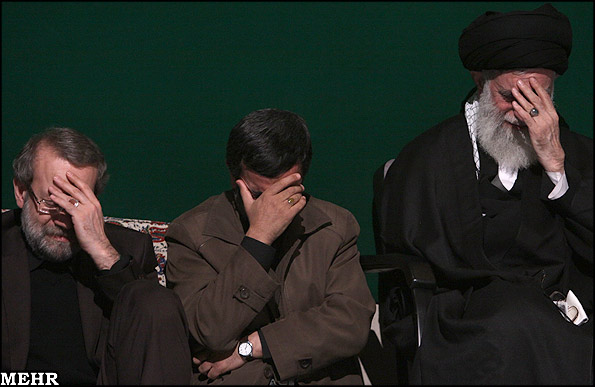 Ali Larijani, Ahmadinejad, Khamenei1950 GMT: Political Prisoner Watch. A petition, launched by Physicians for Human Rights, has called for the release of Dr Arash Alaei, a specialist in the prevention and treatment of HIV and AIDS, from prison.
Ali Larijani, Ahmadinejad, Khamenei1950 GMT: Political Prisoner Watch. A petition, launched by Physicians for Human Rights, has called for the release of Dr Arash Alaei, a specialist in the prevention and treatment of HIV and AIDS, from prison.
Alaei was arrested with his brother and fellow specialist Kamiar in June 2008 for allegedly trying to overthrow the Islamic regime. They participated in several international HIV treatment programmes and conferences held in the US.
Kamiar was released in October but Arash, 42, remains in prison completing a six-year sentence.
The petition has been signed by prominent medics, including two Nobel prize laureates, Françoise Barré-Sinoussi and Sir Richard J Roberts. Susannah Sirkin, PHR's deputy director, explained:
[The Alaeis'] landmark efforts to bring patients, communities and families together to reduce stigma and provide comprehensive Aids prevention and treatment are remarkable and remain singular achievements in healthcare in Iran. We only hope that Dr Arash Alaei can be freed to continue this critical and groundbreaking work.
In 2008 the UN Programme on HIV/AIDS described Iran's needle-exchange programme, developed by the Alaei brothers, as one of the "clear examples of courageous, visionary leadership in the response to HIV".
1900 GMT: Reformist Watch (cont.). Putting together the comments of former Vice President Majid Ansari about reformist participation --- or rather non-participation --- in the 2012 Parliamentary elections (see 1310 and 1530 GMT)....
Ansari, who is a senior member of the reformist Association of Combatant Clerics, said that reformists have not adopted a definite plan for the elections. As for his personal position, he declared, "I have no intention to take part in the election.”
While not committing other reformists to a boycott, Ansari also made a telling comment when he "rejected" the "speculations" of "certain principlist analysts" that a number of prominent reformists, including Ansari, would run in the election. In fact, Ansari was doing much more: last month, Iranian media outlet were circulating a claimed letter from 20 reformists saying that they would campaign. Ansari's statement is an effective challenge that the letter is a fake.
1540 GMT: Revolutionary Guards Do Politics. Ali Saeedi, the Supreme Leader's representative to the Islamic Revolutionary Guards Corps, has said the IRGC will organise 5000 "Political Guides" within its ranks and 7000 within the Basij militia for the 2012 Parliamentary elections.
1530 GMT: Reformist Watch (cont.). Mardomak has a completely different interpretation of the comments of former Vice President Majid Ansari than that of Kalemeh(see 1310 GMT): "The reformists have no plan for participation in the Parliamentary elections in next year."
1310 GMT: Reformist Watch. Majid Ansari, Vice President from 2004 to 2005 under President Khatami, has said there has been no decision on participation in next March's Parliamentary elections.
1300 GMT: All the President's Men. Hamidreza Katouzian, the chairman of Parliament's Energy Commission, has said President Ahmadinejad is nominating Rustam Qassemi as Minister of Industries, Mines, and Trade as well as Minister of Oil.
Qassemi, a Revolutionary Guards commanders who heads the Guards' engineering branch Khatam al-Anbia, is a named target of U.S. and European sanctions.
1230 GMT: Economy Watch. Back from a break for media work to find the Governor of West Azerbaijan Province claiming that 15% to 20% of plants in the area have closed.
0820 GMT: Political Prisoner Watch. Student activist Bahareh Hedayat, serving a 9 1/2-year sentence, has been granted leave from prison for surgery for kidney stones.
0620 GMT: Rafsanjani Watch. Former President Hashemi Rafsanjani has again criticised the economic management of the Ahmadinejad Government, saying 20% to 50% of Iran's food industry has been shut down.
0615 GMT: Political Prisoner Watch. Human rights activist Saeed Jalalifar, a member of the Committee of Human Rights Reporters, was arrested and transferred to Evin Prison on Monday as he arrived at the Revolutionary Court in Tehran to challenge the reversal of his bail.
Jalalifar was previously arrested on 30 November 2009 and released on bail on 16 March 2010.
0600 GMT: We open this morning with an incident from last night that highlights the Supreme Leader's complicated balancing act in the Iranian political conflict.
On the one hand, Ayatollah Khamenei has had to deal with the challenge of a President trying to expand his power since the 2009 election. On the other, he is having to rein in members of Parliament who want to curb Mahmoud Ahmadinejad, if not bring him down altogether.
In a full-and-frank record of a meeting last month between the Supreme Leader and legislators (see separate entry), Khamenei does his utmost to hold back MPs, including Speaker Ali Larijani and Ahmad Tavakoli, the influential representative who has led the charge against Ahmadinejad. He chides a "minority" of MPs for their "hooliganism" and says that the public heckling, as opposed to criticism, of the President is "disgraceful".
But that's only part of the document. While Larijani immediately prostrates himself before the Supreme Leader, offering explanation and forgiveness, Tavakoli carefully but firmly sets out the duty of Parliament to respond to an irresponsible President, to the point of censuring his leading Ministers.